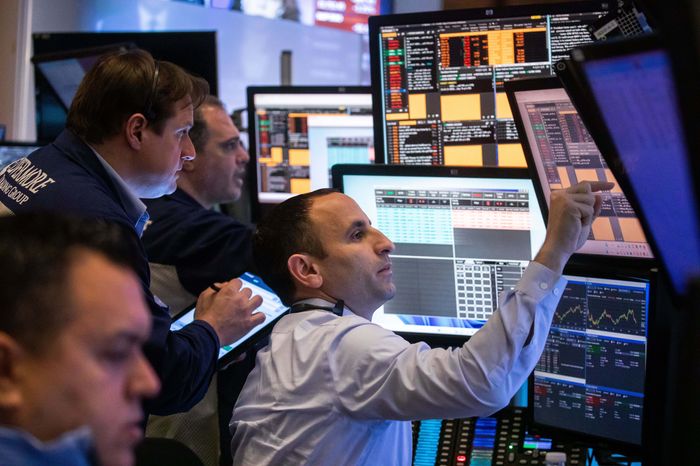A rebound in shares of fast-growing technology firms helped U.S. stock indexes eke out gains Monday after logging their worst week of the year.
Consumer discretionary, industrial and information technology shares led the S&P 500 higher, while so-called safety stocks in utilities, healthcare and consumer staples declined.
The S&P 500 gained 12.20 points, or 0.3%, to close at 3982.24, while the Dow Jones Industrial Average added 72.17 points, or 0.2%, to end at 32889.09. The Nasdaq Composite increased 72.04 points, or 0.6%, to 11466.98.
Union Pacific popped $19.45, or 10%, to close at $212.17 after the railroad company said it would acquiesce to pressure from an activist hedge fund and replace its chief executive.
Renewable-energy companies
and SolarEdge Technologies each added more than 5%. Tesla continued to rally, rising $10.75, or 5.5%, to $207.63, bringing its 2023 gains to 69%.
Pfizer, which The Wall Street Journal reported to be in talks to acquire biotech company Seagen for more than $30 billion, was among the index’s laggards, declining 97 cents, or 2.3%, to $40.78.
which helped pioneer a class of cancer therapy known as antibody drug conjugates that attack tumors with toxic agents, rose $16.79, or 10%, to $178.16.
Stocks have come under pressure this month, as economic data have forced investors to rethink expectations that softening inflation pressures will allow the Fed to soon wrap up its aggressive interest-rate increases. Instead, investors have bolstered bets that Fed policy rates will rise well above 5% and are bracing for more volatility in global markets.
Treasury yields eased Monday, with the yield on the 10-year U.S. note falling to 3.921%, from 3.948% Friday. The yield on the 2-year note, which is more sensitive to expectations around Fed policy, traded at 4.791% after settling Friday at 4.803%, its highest level since July 2007.
James Rutherford, head of European equities at Federated Hermes, said that while recent inflation surprises have unsettled markets, selloffs have been relatively short lived.
“Last week, some of the data spooked people and yields moved up again. But here we are on Monday morning and actually that’s sort of all forgotten about,” said Mr. Rutherford. “People are slightly hardened to it and understand that rates might go a little bit higher…but the market is not looking at next month’s inflation data, it’s looking at six months or nine months or even 12 months.”
Through Monday, the S&P 500 was up 3.7% for the year, while the Nasdaq Composite gained nearly 10% as tech stocks such as
and
continue to post big gains. The blue-chip Dow has lost 0.8%.
Some money managers say that choosing individual stocks is gaining importance after years in which investors could ride rising indexes that were propelled by a few large-cap U.S. stocks with big growth potential. Higher interest rates have increased the opportunity cost of paying for earnings that are expected in the future.
“Instead of the market being driven by five, 10 stocks, now it’s going to be driven by the other 490 stocks,” said Derek Izuel, chief investment officer at Shelton Capital Management. “That gives active managers a lot more room to find top-performing stocks and to outperform their benchmarks.”

Economic data have forced investors to rethink expectations around inflation pressures.
Photo:
Liu Yanan/Zuma Press
The highest yields in 15 years and mounting economic uncertainty have wealth managers looking past volatile stocks and putting more of clients’ money into income-generating securities, such as government bonds and investment-grade corporate debt.
“We’re skewing on the margins toward fixed income,” said Daniel Berkowitz, investment director at Prudent Management Associates, whose clients include wealthy families and endowments. “We’re not actively selling equities, but we like the relative attractiveness of bonds.”
Monday added more mixed signals for investors. U.S. durable-goods orders fell a sharper-than-expected 4.5% in January, though new orders for nondefense capital goods excluding aircraft—a closely watched proxy for business investment—increased 0.8% from the prior month.
Meanwhile, the housing market showed another sign it is thawing, as pending home sales increased in January for the second straight month, up 8.1% from December, the National Association of Realtors said Monday. The Fed has made slowing the red-hot pandemic housing market with higher borrowing costs central to its fight against inflation.
Investors will also watch data this week on U.S. manufacturing and services and European inflation.
Overseas stocks were mixed. The Stoxx Europe 600 ended up 1.1% and the U.K.’s FTSE 100 added 0.7%. Asian stocks fell, with Hong Kong’s Hang Seng down 0.3% while Japan’s Nikkei 225 slipped 0.1%. South Korea’s Kospi index declined 0.9%.
In commodities, Brent crude futures, the global oil-price gauge, shed 0.9%, or 71 cents a barrel, to settle at $82.45. The U.S. benchmark slid to $75.68 a barrel. U.S. natural-gas prices continued on their roller coaster, rising 7.2% to $2.731 per million British thermal units.
Write to Ryan Dezember at ryan.dezember@wsj.com and Chelsey Dulaney at chelsey.dulaney@wsj.com
Copyright ©2022 Dow Jones & Company, Inc. All Rights Reserved. 87990cbe856818d5eddac44c7b1cdeb8










